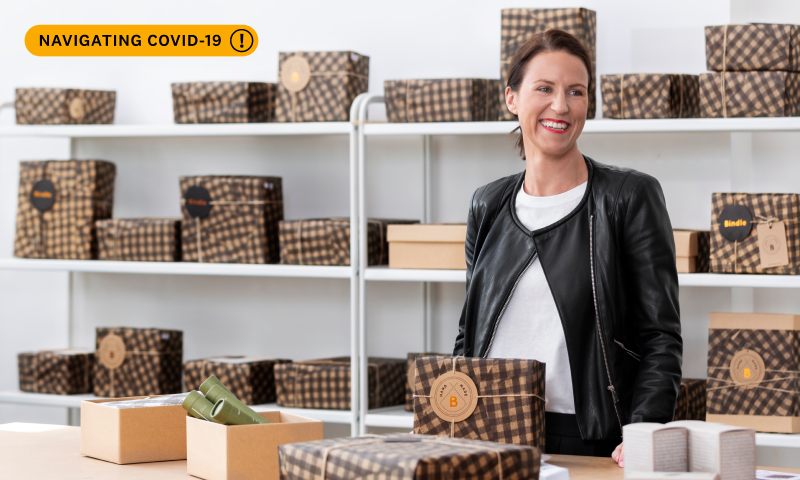
The posts in this series have been drawn from Xero’s Stronger and smarter: a small business handbook. Designed to help small businesses determine which steps to take next, this practical guide uncovers the 10 trends shaping the future – so you can come back stronger and smarter than ever.
Melbourne-based boutique gifting company Bindle grew from being a small, home-based business to a thriving enterprise thanks to a key point of difference: it only sells products grown, made and sourced in Australia. With an expanding contingent of consumers now keen to buy local, Bindle is poised to provide them with exactly what they are looking for.
Catherine Blackford knew her business was more than a side hustle when she found herself catching a Maxi Taxi to the post office to ship orders before heading to her day job as an analyst at the Parliament of Victoria.
“Bindle started as a hobby in the corner of my apartment. The business grew so much, I decided to take a leap of faith and focus all of my energy on it.”
Now, she runs Bindle from a warehouse in Richmond, with a small team of permanent and casual staff. Using only Australian suppliers, the brand has gone from strength to strength based on growing consumer demand for locally made products.
Shop local
“There are lots of hamper companies, but I wanted to create something with more thought behind it,” explains Catherine. “Buying locally helps artisans. You’re supporting individuals and families rather than large corporations.”
From the boxes to the products enclosed inside, every element of a Bindle gift is designed, sourced and wrapped on home soil.
Instead of shipping in cheaper, mass-produced products from overseas, there’s wine from Yarra Valley winemaker Mac Forbes, botanical skincare by Sydney label Leif, and honey fresh from the urban hives of Melbourne City Rooftop Honey.
Of course, the costs associated with sourcing boutique local items are often significantly higher. However, making the conscious choice to offer higher quality, beautifully packaged gifts with a unique backstory ensures that Bindle is in a league of its own.
Despite the challenges, there are numerous benefits to this approach. By using Australian suppliers, Catherine can avoid quality control issues while reducing the transportation costs and risks associated with relying on a single, offshore supplier. Because of this, Bindle has avoided the supply chain issues and delays that are impacting many businesses during COVID-19.
“Having strong relationships with local suppliers has made Bindle more resilient. Our suppliers are on our doorstep… we’re not waiting for stock to come in from elsewhere.”
This also means that Bindle’s carbon footprint is reduced – an important selling point for environmentally aware consumers.
Collaboration is key
Referring to her suppliers as a community, Catherine views Bindle’s success as a collaborative effort. It’s this sense of community that led her to launch the Bindle Nurture 4 Nurses campaign, which resulted in over 100 care packages being sent to Australian nurses during the pandemic.
Collaboration is also key to keeping the back end of Bindle ticking along, with Catherine integrating and streamlining processes to save time and reduce stress.
“Numbers aren’t my strength, so Xero keeps me on the straight and narrow,” she explains.
This approach enables Catherine to focus her time on what she’s best at: sourcing beautiful products made by Australian artisans and producers.
“Supporting the local community by reinvesting money back into the economy is what Bindle is all about.”
Catherine’s tips for keeping things local
Harness the power of storytelling
Buying from local artisans communicates a sense of place and ensures a unique experience. That’s why we display detailed product information on the Bindle website – it helps customers feel connected to our suppliers.
Meet your suppliers
Sourcing the product is part of the fun, so we always visit markets and cellar doors to meet suppliers and learn as much as we can about their products.
Play the long game
In the beginning, I didn’t have much negotiating power with suppliers, as Bindle wasn’t well known. But as the brand grew, I was able to negotiate better prices.
Leave a Reply